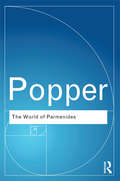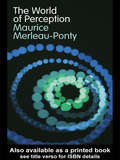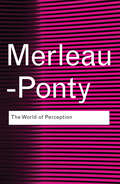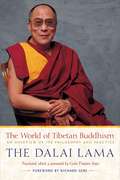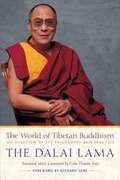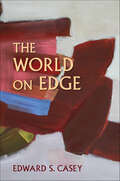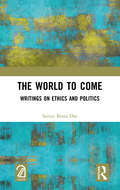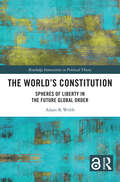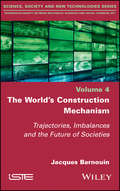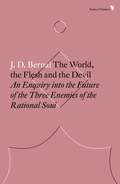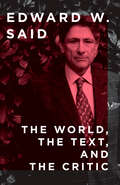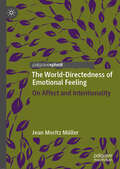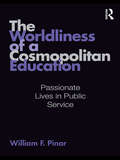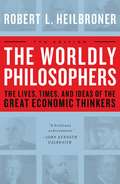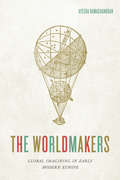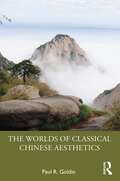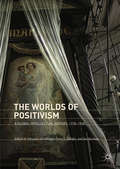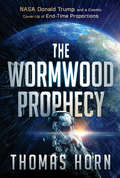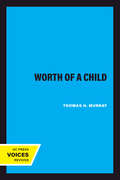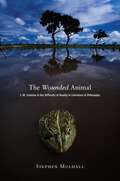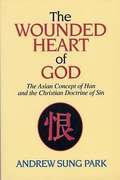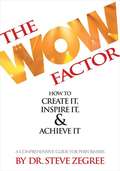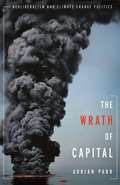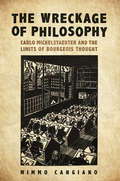- Table View
- List View
The World of Parmenides: Essays on the Presocratic Enlightenment (Routledge Classics)
by Karl PopperWith a new foreword by Scott Austin 'I hope that these essays may illustrate the thesis that all history is or should be the history of problem situations, and that in following this principle we may further our understanding of the Presocratics and other thinkers of the past. The essays also try to show the greatness of the early Greek philosophers, who gave Europe its philosophy, its science, and its humanism.' - Karl Popper, from the preface The World of Parmenides is a brilliant exploration of the complexity of ancient Greek thought and science by one of the twentieth century’s leading philosophers. It reveals the great importance of Presocratic philosophy to Popper’s thought as a whole and shows the profound enlightenment he experienced reading not only Parmenides but the wider world of Greek science and philosophy including Xenophanes and Heraclitus. Edited by Arne F. Petersen, Associate Professor in the Faculty of Humanities, University of Copenhagen.
The World of Perception
by Maurice Merleau-Ponty'Painting does not imitate the world, but is a world of its own.'In 1948, Maurice Merleau-Ponty wrote and delivered on French radio a series of seven lectures on the theme of perception. Translated here into English for the first time, they offer a lucid and concise insight into one of the great philosophical minds of the twentieth-century.These lectures explore themes central not only to Merleau-Ponty's philosophy but phenomenology as a whole. He begins by rejecting the idea - inherited from Descartes and influential within science - that perception is unreliable and prone to distort the world around us. Merleau-Ponty instead argues that perception is inseparable from our senses and it is how we make sense of the world. Merleau-Ponty explores this guiding theme through a brilliant series of reflections on science, space, our relationships with others, animal life and art. Throughout, he argues that perception is never something learned and then applied to the world. As creatures with embodied minds, he reminds us that we are born perceiving and share with other animals and infants a state of constant, raw, unpredictable contact with the world. He provides vivid examples with the help of Kafka, animal behaviour and above all modern art, particularly the work of Cezanne.A thought-provoking and crystalline exploration of consciousness and the senses, The World of Perception is essential reading for anyone interested in the work of Merleau-Ponty, twentieth-century philosophy and art.
The World of Perception
by Maurice Merleau-Ponty'In simple prose Merleau-Ponty touches on his principle themes. He speaks about the body and the world, the coexistence of space and things, the unfortunate optimism of science – and also the insidious stickiness of honey, and the mystery of anger.' - James ElkinsMaurice Merleau-Ponty was one of the most important thinkers of the post-war era. Central to his thought was the idea that human understanding comes from our bodily experience of the world that we perceive: a deceptively simple argument, perhaps, but one that he felt had to be made in the wake of attacks from contemporary science and the philosophy of Descartes on the reliability of human perception.From this starting point, Merleau-Ponty presented these seven lectures on The World of Perception to French radio listeners in 1948. Available in a paperback English translation for the first time in the Routledge Classics series to mark the centenary of Merleau-Ponty’s birth, this is a dazzling and accessible guide to a whole universe of experience, from the pursuit of scientific knowledge, through the psychic life of animals to the glories of the art of Paul Cézanne.
The World of Tibetan Buddhism
by Thupten Jinpa Richard Gere His Holiness the Dalai LamaWith characteristic humility, His Holiness the Dalai Lama begins this landmark survey of the entire Buddhist path by saying, "I think an overview of Tibetan Buddhism for the purpose of providing a comprehensive framework of the path may prove helpful in deepening your understanding and practice." In this book, the Dalai Lama delivers a presentation that is both concise and profound, accessible and engaging. As readers explore Tibetan Buddhism more fully than ever before, they will find in His Holiness a great friend and authority.
The World of Tibetan Buddhism: An Overview of Its Philosophy And Practice
by Dalai Lama Xiv Thupten Jinpa Richard GereIntroduces the basic beliefs of Buddhism, discusses the practices of loving and kindness, and looks at Vajrayana Buddhism and the path of tantra.
The World on Edge (Studies in Continental Thought)
by Edward S. CaseyFrom one of continental philosophy's most distinctive voices comes a creative contribution to spatial studies, environmental philosophy, and phenomenology. Edward S. Casey identifies how important edges are to us, not only in terms of how we perceive our world, but in our cognitive, artistic, and sociopolitical attentions to it. We live in a world that is constantly on edge, yet edges as such are rarely explored. Casey systematically describes the major and minor edges that configure the human and other-than-human realms, including our everyday experience. He also explores edges in high- stakes situations, such as those that emerge in natural disasters, moments of political and economic upheaval, and encroaching climate change. Casey's work enables a more lucid understanding of the edge-world that is a necessary part of living in a shared global environment.
The World to Come: Writings on Ethics and Politics
by Saitya Brata DasAt the heart of the messianic thinking lies an unconditional idea of redemption. The messianic idea of unconditionality is based upon a qualitative distinction between the unredeemed world and the world to come. It is fundamental to this messianic idea that this distinction can't be grasped as transition or mediation. Taking his inspiration from thinkers like Jacques Derrida, Emmanuel Lévinas, Walter Benjamin and Franz Rosenzweig, Saitya Brata Das renews here this task of the unconditional, the task of thinking “the advent of pure future that is always to come", unenclosed in the bounds of law or in the cages of the “worldly”. He thereby draws profound ethico-political implications from such a thought that opens up the infinitude of the future from the heart of our finitude, and shows that such thinking is the very task of our time.
The World's Constitution: Spheres of Liberty in the Future Global Order (Routledge Innovations in Political Theory)
by Adam K. WebbGlobal governance is tightening and foreshadows that world state formation will become a live political issue in this century. Some observers treat it as inevitable amid the urgency of global issues. They foresee a technocratic scaling up of the model of state authority that has prevailed at the national level for over two hundred years. Many critics and members of the public around the world look askance at that prospect. They rightly fear a moral vacuum of authority disconnected from the world’s traditions, and a concentration of power that would be damaging to liberty or even dystopian in its upshot. Still, they often merely aim to stand athwart the scaling up of political institutions, rather than actively trying to shape an alternative that can seize the global horizon.The World’s Constitution: Spheres of Liberty in the Future Global Order offers a radically different vision of future world order that could work in a global space while shifting the balance of power from state back to society. It draws on older resources in political thought, both Western and non-Western, to upend mainstream notions of statehood and sovereignty that have been taken for granted for too long in the modern era. It offers an original ‘sphere pluralist’ framework that can reconcile liberty, tradition, and cosmopolitanism. As a book rooted in the past but mindful of future constitutional and policy challenges, it bridges ideas and real-world implications, with insights that cut across a wide range of topics from migration and social welfare to personal law systems and channels of representation. It opens an exciting debate about global constitutional futures that is likely to become more salient over the next couple of generations.The Open Access version of this book, available at http://www.taylorfrancis.com, has been made available under a Creative Commons Attribution-Non Commercial-No Derivatives (CC-BY-NC-ND) 4.0 license.
The World's Construction Mechanism: Trajectories, Imbalances, and the Future of Societies
by Jacques BarnouinThe interdisciplinarity between the biological and human sciences is here to serve a daring objective: to decipher, by means of a logical chain, the explanatory factors of human trajectories and imbalances between societies and nations. To do this, The World’s Construction Mechanism is based on an unprecedented analysis of the dynamics of the human species, combining the contributions of anthropology, archeology, biology, climatology, economics, geography, history and sociology. This book analyzes the roots of societal disharmony and presents ways of realizing a clear-sighted human project that is in step with the general interest of humanity.
The World, the Flesh and the Devil: An Enquiry into the Future of the Three Enemies of the Rational Soul
by J. D. BernalA pioneering book proposing a transhumanist vision of the future, from one of the most influential visionary scientists of the twentieth century.
The World, the Text, and the Critic
by Edward W. SaidA sweeping and intellectually rigorous work of literary criticism that moves the field forward, from one of the preeminent public scholars &“[Said&’s] book is relaxed and discursive, original, immensely learned, fluently written.&”―John Bayley, The New York Times Book ReviewEdward W. Said, author of Beginnings and the controversial yet seminal Orientalism, is one of the most acclaimed public intellectuals of our time. In this sweeping and rigorous work of literary criticism, he pushes the field even further forward. Moving from Derrida to Foucault, from Marxism to psychoanalysis, and from Swift to Conrad, Said argues that the dogmas of the dominant culture have crippled our engagement with literature, forcing a text to meet the requirements of theory while ignoring the tethers that bind it to the living world.Provocatively, Said advocates for freedom of consciousness and for responsiveness to history; to the exigencies of the text; to political, social, and human values; and to the heterogeneity of human experience. The World, the Text, and the Critic asks daring questions, investigates problems of urgent significance, and gives a subtle yet powerful new meaning to the enterprise of criticism in modern society.
The World-Directedness of Emotional Feeling: On Affect and Intentionality
by Jean Moritz MüllerThis book engages with what are widely recognized as the two core dimensions of emotion. When we are afraid, glad or disappointed, we feel a certain way; moreover, our emotion is intentional or directed at something: we are afraid of something, glad or disappointed about something. Connecting with a vital strand of recent philosophical thinking, Müller conceives of these two aspects of emotion as unified. Examining different possible ways of developing the view that the feeling dimension of emotion is itself intentional, he argues against the currently popular view that it is a form of perception-like receptivity to value. Müller instead proposes that emotional feeling is a specific type of response to value, an affective ‘position-taking’. This alternative conceives of emotional feeling as intimately related to our cares and concerns. While situating itself within the analytic-philosophical debate on emotion, the discussion crucially draws on ideas from the early phenomenological tradition and thinks past the theoretical strictures of many contemporary approaches to this subject. The result is an innovative view of emotional feeling as a thoroughly personal form of engagement with value.
The World-Time Parallel: Tense and Modality in Logic and Metaphysics
by A. A. Rini M. J CresswellIs what could have happened but never did as real as what did happen? What did happen, but isn't happening now, happened at another time. Analogously, one can say that what could have happened happens in another possible world. Whatever their views about the reality of such things as possible worlds, philosophers need to take this analogy seriously. Adriane Rini and Max Cresswell exhibit, in an easy step-by-step manner, the logical structure of temporal and modal discourse, and show that every temporal construction has an exact parallel that requires a language that can refer to worlds, and vice versa. They make precise, in a way which can be articulated and tested, the claim that the parallel is at work behind even ordinary talk about time and modality. The book gives metaphysicians a sturdy framework for the investigation of time and modality – one that does not presuppose any particular metaphysical view.
The Worldliness of a Cosmopolitan Education: Passionate Lives in Public Service (Studies in Curriculum Theory Series)
by William PinarPinar positions himself against three pressing problems of the profession: the crime of collectivism that identity politics commits, the devaluation of academic knowledge by the programmatic preoccupations of teacher education, and the effacement of educational experience by standardized testing. A cosmopolitan curriculum, Pinar argues, juxtaposes the abstract and the concrete, the collective and the individual: history and biography, politics and art, public service and private passion. Such a curriculum provides passages between the subjective and the social, and in so doing, engenders that worldliness a cosmopolitan education invites. Such worldliness is vividly discernible in the lives of three heroic individuals: Jane Addams (1860-1935), Laura Bragg (1881-1978), and Pier Paolo Pasolini (1922-1975). What these disparate individuals demonstrate is the centrality of subjectivity in the cultivation of cosmopolitanism. Subjectivity takes form in the world, and the world is itself reconstructed by subjectivity’s engagement with it. In this intriguing, thought-provoking, and nuanced work, Pinar outlines a cosmopolitan curriculum focused on passionate lives in public service, providing one set of answers to how the field accepts and attends to the inextricably interwoven relations among intellectual rigor, scholarly erudition, and intense but variegated engagement with the world.
The Worldly Philosophers
by Robert L. HeilbronerThe Worldly Philosophers is a bestselling classic that not only enables us to see more deeply into our history but helps us better understand our own times. In this seventh edition, Robert L. Heilbroner provides a new theme that connects thinkers as diverse as Adam Smith and Karl Marx. The theme is the common focus of their highly varied ideas -- namely, the search to understand how a capitalist society works. It is a focus never more needed than in this age of confusing economic headlines. In a bold new concluding chapter entitled "The End of the Worldly Philosophy?" Heilbroner reminds us that the word "end" refers to both the purpose and limits of economics. This chapter conveys a concern that today's increasingly "scientific" economics may overlook fundamental social and political issues that are central to economics. Thus, unlike its predecessors, this new edition provides not just an indispensable illumination of our past but a call to action for our future.
The Worldmakers: Global Imagining in Early Modern Europe
by Ayesha RamachandranIn this beautifully conceived book, Ayesha Ramachandran reconstructs the imaginative struggles of early modern artists, philosophers, and writers to make sense of something that we take for granted: the world, imagined as a whole. Once a new, exciting, and frightening concept, "the world" was transformed in the sixteenth and seventeenth centuries. But how could one envision something that no one had ever seen in its totality? The Worldmakers moves beyond histories of globalization to explore how "the world" itself--variously understood as an object of inquiry, a comprehensive category, and a system of order--was self-consciously shaped by human agents. Gathering an international cast of characters, from Dutch cartographers and French philosophers to Portuguese and English poets, Ramachandran describes a history of firsts: the first world atlas, the first global epic, the first modern attempt to develop a systematic natural philosophy--all part of an effort by early modern thinkers to capture "the world" on the page.
The Worlds of Classical Chinese Aesthetics
by Paul R. GoldinThis book presents the foundations of classical Chinese aesthetic discourse - roughly from the Bronze Age to the early Middle Ages - with the following animating questions:What is art?Why do we produce it?How do we judge it?The arts that garnered the most theoretical attention during this time period were music, poetry, calligraphy, and painting, and this book considers the reasons why these four were privileged. Whereas modern artists most likely consider themselves musicians or poets or calligraphers or painters or sculptors or architects, the pre-modern authors who produced the literature that established Chinese aesthetics prided themselves on being wenren, “cultured people,” conversant with all forms of art and learning. Other comparisons with Western theories and works of art are presented at due junctures.Key Features Addresses Chinese aesthetic discourse on its own terms Provides comparisons of key concepts and theories with examples from Western sources Includes more coverage of primary sources than any other English-language book on the subject Each chapter opens with a helpful summary, highlighting the chapter’s key themes
The Worlds of Positivism: A Global Intellectual History, 1770-1930
by Jan Surman Johannes Feichtinger Franz L. FillaferThis book is the first to trace the origins and significance of positivism on a global scale. Taking their cues from Auguste Comte and John Stuart Mill, positivists pioneered a universal, experience-based culture of scientific inquiry for studying nature and society--a new science that would enlighten all of humankind. Positivists envisaged one world united by science, but their efforts spawned many. Uncovering these worlds of positivism, the volume ranges from India, the Ottoman Empire, and the Iberian Peninsula to Central Europe, Russia, and Brazil, examining positivism's impact as one of the most far-reaching intellectual movements of the modern world. Positivists reinvented science, claiming it to be distinct from and superior to the humanities. They predicated political governance on their refashioned science of society, and as political activists, they sought and often failed to reconcile their universalism with the values of multiculturalism. Providing a genealogy of scientific governance that is sorely needed in an age of post-truth politics, this volume breaks new ground in the fields of intellectual and global history, the history of science, and philosophy.
The Wormwood Prophecy: NASA, Donald Trump, and a Cosmic Cover-up of End-Time Proportions
by Thomas HornDoes the Bible predict an asteroid…or something else? This book will challenge your interpretation of end-times theology and help you sharpen your understanding in light of current times. Does Revelation 8:10–11 describe an asteroid? Is the Wormwood star from Revelation 8 already headed toward Earth? Are NASA and high-level government officials aware of an asteroid that is on a collision course with our planet? Is that why President Trump sanctioned a colossal increase to planetary defense? Do the prophecies from ancient cultures and religions across the globe all point to a catastrophic planetary event that has scientists and politicians taking extreme preventative measures under the public radar? Earth is not currently prepared for the scope of impact that may be just around the corner, and people in high places know it… But what will the biblical Wormwood actually be? Traditional scholarly interpretation claims it will be an asteroid. Others postulate that the eschatological poisoning of one-third of all Earth's waters and the devastation of our planet's ecology might not be as detectable as we may believe: it could hit suddenly and without warning, like an angel of God appearing in the sky with fire and light, bringing judgment in an instant. Follow Thomas Horn as he blazes a trail through these questions and many others, posing answers that very few in the church today are willing to provide.FEATURES AND BENEFITS:Examines asteroid threats to Earth, including Apophis (named after the Egyptian god of chaos), which is a topic of serious discussion among experts in planetary defenseIncludes interviews with government impact specialists, scientists, Bible scholars, and prophecy experts
The Worth of a Child
by Thomas H. MurrayThomas Murray's graceful and humane book illuminates one of the most morally complex areas of everyday life: the relationship between parents and children. What do children mean to their parents, and how far do parental obligations go? What, from the beginning of life to its end, is the worth of a child?Ethicist Murray leaves the rarefied air of abstract moral philosophy in order to reflect on the moral perplexities of ordinary life and ordinary people. Observing that abstract moral terms such as altruism and selfishness can be buried in the everyday doings of families, he maintains that ethical theory needs a richer description than it now has of the moral life of parents and children. How far should adults go in their quest for children? What options are available to women who do not want to bear a child now? Should couples be allowed to reject a child because of genetic disability or "wrong" gender? How can we weigh the competing claims of the genetic and the rearing parents to a particular child?The Worth of a Child couples impressive learning with a conversational style. Only by getting down to cases, Murray insists, can we reach moral conclusions that are unsentimental, farsighted, and just. In an era of intense public and private acrimony about the place and meaning of "family values," his practical wisdom about extraordinary difficult moral issues offers compelling reading for both experienced and prospective parents, as well as for ethicists, social and behavioral scientists, and legal theorists.
The Wounded Animal: J. M. Coetzee and the Difficulty of Reality in Literature and Philosophy
by Stephen MulhallIn 1997, the Nobel Prize-winning novelist J. M. Coetzee, invited to Princeton University to lecture on the moral status of animals, read a work of fiction about an eminent novelist, Elizabeth Costello, invited to lecture on the moral status of animals at an American college. Coetzee's lectures were published in 1999 as The Lives of Animals, and reappeared in 2003 as part of his novel Elizabeth Costello; and both lectures and novel have attracted the critical attention of a number of influential philosophers--including Peter Singer, Cora Diamond, Stanley Cavell, and John McDowell. In The Wounded Animal, Stephen Mulhall closely examines Coetzee's writings about Costello, and the ways in which philosophers have responded to them, focusing in particular on their powerful presentation of both literature and philosophy as seeking, and failing, to represent reality--in part because of reality's resistance to such projects of understanding, but also because of philosophy's unwillingness to learn from literature how best to acknowledge that resistance. In so doing, Mulhall is led to consider the relations among reason, language, and the imagination, as well as more specific ethical issues concerning the moral status of animals, the meaning of mortality, the nature of evil, and the demands of religion. The ancient quarrel between philosophy and literature here displays undiminished vigor and renewed significance.
The Wounded Heart of God
by Andrew S. ParkPark asserts that one cannot grasp the full meaning of the sin and guilt of sinners until one has looked at the Korean concept of han--the relational consequence of sin--and shame of their victims. To reconcile with God and with other humans, one's sin must be repented, guilt must be forgiven, the han of those who have been wronged must be healed, and the shame which results from that wrong must be erased.
The Wow Factor: A Comprehensive Guide for Performers
by Steve ZegreeDr. Steve Zegree of Western Michigan University, choral arranger and conductor of Western Michigan's Gold Company has developed this practical guide for performers, students, teachers and parents which offers fundamental philosophies and concepts that are essential to a person's growth and development and will contribute to a successful professional life in music.
The Wrath of Capital: Neoliberalism and Climate Change Politics (New Directions in Critical Theory #48)
by Adrian ParrAlthough climate change has become the dominant concern of the twenty-first century, global powers refuse to implement the changes necessary to reverse these trends. Instead, they have neoliberalized nature and climate change politics and discourse, and there are indications of a more virulent strain of capital accumulation on the horizon. Adrian Parr calls attention to the problematic socioeconomic conditions of neoliberal capitalism underpinning the world's environmental challenges, and she argues that, until we grasp the implications of neoliberalism's interference in climate change talks and policy, humanity is on track to an irreversible crisis.Parr not only exposes the global failure to produce equitable political options for environmental regulation, but she also breaks down the dominant political paradigms hindering the discovery of viable alternatives. She highlights the neoliberalization of nature in the development of green technologies, land use, dietary habits, reproductive practices, consumption patterns, design strategies, and media. She dismisses the notion that the free market can solve debilitating environmental degradation and climate change as nothing more than a political ghost emptied of its collective aspirations. Decrying what she perceives as a failure of the human imagination and an impoverishment of political institutions, Parr ruminates on the nature of change and existence in the absence of a future. The sustainability movement, she contends, must engage more aggressively with the logic and cultural manifestations of consumer economics to take hold of a more transformative politics. If the economically powerful continue to monopolize the meaning of environmental change, she warns, new and more promising collective solutions will fail to take root.
The Wreckage of Philosophy: Carlo Michelstaedter and the Limits of Bourgeois Thought (Toronto Italian Studies)
by Mimmo CangianoThe work of Carlo Michelstaedter (1887–1910) was the first to analyze modernist philosophy in strict connection with social changes in mass society. Revealing how Michelstaedter was able to unveil the relations between pivotal early-modernist philosophies and social restructurings, The Wreckage of Philosophy examines the ongoing processes of "specialization," "rationalization," and "atomization." It points out how Michelstaedter connected the main theoretical expressions of modernism with the decisive social transformations of the early twentieth century, taking into consideration the key players of modernist philosophy, such as Friedrich Nietzsche, Henri Bergson, Ernst Mach, and William James. By following Michelstaedter’s analysis and strategies, The Wreckage of Philosophy focuses on several intertwined issues: the distinct philosophical positions within the modernist area; the connections between philosophy and modernist literature; the relations between intellectual positions and social upheavals; and the early-twentieth-century links among traditional philosophy, critique of language, and epistemology of technique.
